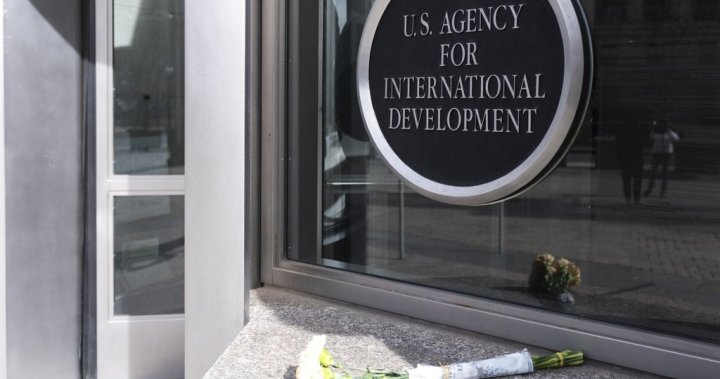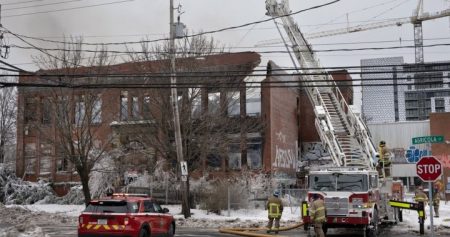Canada’s Aid Sector Braces for Global Cataclysm Amid USAID Funding Freeze
Canada’s aid sector is facing an unprecedented crisis as the world’s largest funder of international development, the U.S. Agency for International Development (USAID), scales back its operations. The U.S. government, under President Donald Trump, has imposed a 90-day freeze on most foreign aid programs, leaving millions of people worldwide at risk of losing access to life-saving supplies, healthcare, education, and food assistance. This sudden withdrawal of funding has thrown Canadian aid projects into chaos, with many programs now in limbo. Cooperation Canada, a coalition representing dozens of Canadian non-profits, warns that the impact of this decision will be catastrophic, affecting thousands, if not millions, of people globally.
Kate Higgins, the head of Cooperation Canada, emphasizes that this crisis forces Canadians to reflect on the kind of country they aspire to be. “The impact of this is catastrophic,” she said, urging the Canadian government to step in and fill the gaps left by the U.S. withdrawal. The situation has raised concerns about Canada’s ability to continue its humanitarian efforts, particularly in regions where USAID has been a critical partner.
The Ripple Effect: Global Aid Programs in Jeopardy
The freeze on USAID funding has already begun to disrupt critical aid programs worldwide. For instance, $450 million worth of food grown by U.S. farmers, enough to feed 36 million people, remains undelivered due to unpaid invoices. In Sudan’s Darfur region, 1.6 million displaced people are now without access to water pumps, which are essential for survival in the desert. These examples highlight the devastating consequences of the U.S. decision, which has left vulnerable populations without the support they desperately need.
In Canada, many aid organizations rely on USAID or United Nations agencies that depend heavily on U.S. funding. These organizations are now scrambling to redesign their programs and explore alternative funding sources. Higgins warns that without intervention, many of these projects will be forced to shut down, leaving critical gaps in emergency medicine, education, and hunger relief.
Global Partnerships Tested: Canada’s Aid Sector Scrambles to Respond
The Canadian government has been in touch with the aid sector to manage the disruption, but the situation remains dire. “Critical partners, that are part of the implementation of those projects, are shutting their doors,” Higgins said, emphasizing the urgency of the situation. Global Affairs Canada has acknowledged the crisis and is assessing the impact of the U.S. funding freeze. However, the department has not yet provided details on the status of specific projects or the extent of Canadian funding allocated to USAID that remains unspent.
For instance, Canada had funded several development projects through USAID, including climate-change adaptation efforts in Peruvian watersheds and a program to support LGBTQ+ activists fleeing violence. The fate of these initiatives remains uncertain, leaving aid workers and beneficiaries in a state of limbo. Global Affairs Canada spokesman Louis-Carl Brissette Lesage stated that no final decisions have been made and that updates will be provided as the situation evolves.
Ottawa’s Response: A Call for Leadership and New Partnerships
International Development Minister Ahmed Hussen’s office has expressed deep concern over the U.S. decision, calling it a “dangerous retreat” that risks decades of progress in fighting inequality, starvation, and pandemics. Spokeswoman Olivia Batten highlighted the importance of collective action, stating that Canada will continue to forge new partnerships to support peace, security, and prosperity globally.
Foreign Affairs Minister Mélanie Joly has also weighed in on the issue, planning to discuss the USAID funding freeze with U.S. Secretary of State Marco Rubio at the upcoming G7 foreign ministers’ meeting in Germany. Joly warned that the U.S. withdrawal from foreign aid creates a vacuum that could be exploited by adversaries like China and Russia, undermining Western influence in the developing world.
A Leadership Moment for Canada: Filling the Aid Gap
As the global aid landscape continues to destabilize, Canada is being called upon to demonstrate leadership and compassion. Cooperation Canada’s Kate Higgins stressed that this moment is critical for Canada to step up and fill the gaps left by the U.S. withdrawal. “We need to show leadership at this very destabilizing point in global history,” she said.
Higgins also called on Canadians to live up to their reputation as a compassionate and responsible global citizenry. “What happens in other countries has direct implications for our own safety, security, and prosperity,” she reminded. Canada’s response to this crisis will not only determine the fate of millions of people worldwide but also define its role as a leader in international development.
Conclusion: A Call to Action for Compassionate Global Leadership
The sudden freeze on USAID funding has created a perfect storm of uncertainty for global aid efforts, with far-reaching consequences for vulnerable populations. As Canada navigates this crisis, the government and its people are being challenged to think critically about their values and commitments to the world. The question is not just about filling funding gaps but about reaffirming Canada’s identity as a compassionate and responsible nation.
With the world facing unprecedented challenges, from pandemics to climate change, the need for collective action has never been greater. Canada’s response to this crisis will set a precedent for its role in addressing global issues. By stepping up to support international development and humanitarian efforts, Canada can help mitigate the suffering caused by the U.S. withdrawal and reaffirm its commitment to a more equitable and just world.












